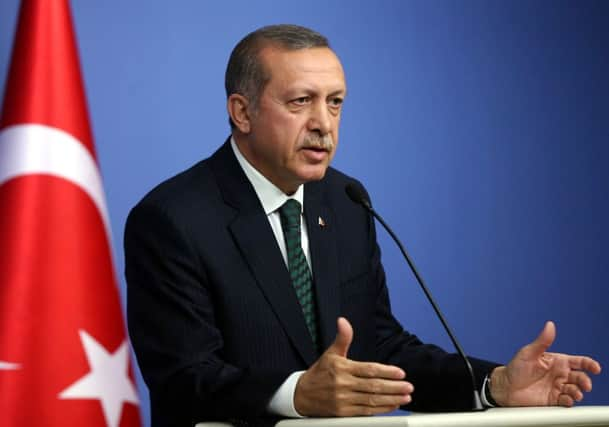Turkey: Police chief sacked in corruption crackdown


Huseyin Capkin was the most senior commander to be sacked following the dismissal of dozens of senior officers on Wednesday over what Mr Erdogan has termed a “dirty operation” to tarnish the government.
Scores of people including sons of three ministers and prominent businessmen close to Mr Erdogan have been detained in an action seen widely as a symptom of a power struggle with US-based cleric Fethullah Gulen, who wields influence through his Hizmet organisation and its many members in the police and judiciary.
Advertisement
Hide AdAdvertisement
Hide AdMr Capkin – who was moved to a low-profile post in the interior ministry – told Turkish television yesterday: “Just as naturally as it was for us to come, so it is equally natural for us to go. We have tried to serve our state, our nation with loyalty.”
Mr Erdogan’s AK Party was created in 2001 from a coalition of conservative religious, centrist and nationalist politicians. It swept to power in 2002, drawing on fury over corruption and economic incompetence. Turks have seen unprecedented prosperity since then, but underlying perceptions of corruption remain.
Writer and columnist Cengiz Candar said: “Corruption in Turkey is the Achilles’ heel of the AK Party. It also undermines their approach towards their morality, which is grounded in Islam. Corruption has an important impact in terms of determining the success of ruling parties at the ballot box.”
Mr Erdogan, still the most popular Turkish leader of modern times, said he would not tolerate corruption, but saw in the raids a conspiracy to “create a state within the state”.
Increasing Turkish influence across the Middle East and Africa has been driven, many say, by three motors: Turkish diplomacy, Turkish commerce, notably in construction, and the work of Mr Gulen, who has set up a network of private schools stretching also to Europe, Asia and the United States.
Hizmet has backed Mr Erdogan’s moves to banish the army from politics, ending decades of military interventions to overthrow elected governments, including an Islamist-led administration in 1997. Hundreds of senior Turkish officers, strongly secularist and wary of Mr Erdogan’s Islamist background, have gone to prison on charges of preparing a coup.
Mr Gulen’s Hizmet (Service) movement, long a close ally of Mr Erdogan, has in recent months publicly fallen out with the prime minister over his plans to shut down private schools in Turkey, including those run by Hizmet.